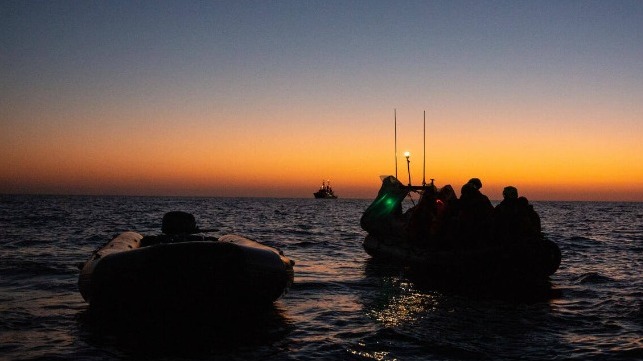Italian Government Takes First Steps to Rein In Migrant Rescue Vessels

The newly-elected government of Italian Prime Minister Giorgia Meloni may be laying the groundwork to reinstate limits on NGO rescue vessels, which were eased under the previous administration.
Meloni has appointed Matteo Piantedosi, a civil servant who worked under former Interior Minister Matteo Salvini, to head up his former department. Salvini was known for his well-publicized efforts to prevent migrant arrivals, including measures to block or criminalize migrant rescue at sea. He is currently on trial on kidnapping charges for holding migrants aboard an Italian Coast Guard vessel, and he also faces a defamation trial for past comments about the female captain of an NGO rescue vessel.
Piantedosi served as Salvini's chief of cabinet during his tenure at the ministry, but he does not face similar charges. As the newly-appointed interior minister, he has issued a directive finding that two NGO vessels - Ocean Viking and Humanity 1 - may have operated improperly by carrying out rescues without informing the authorities first. The order suggests that their operations are not "in line with the spirit of the rules on security and border control and the fight against illegal immigration." The directive could be used as a justification to prohibit the rescue ships from entering Italian ports, according to Italy's Corriere della Sera.
NGO-operated rescue vessels in the Central Mediterranean typically disembark migrant survivors in Italy, as Malta excludes them and Libya presents certain health and safety concerns. These operators deliver thousands of rescued migrants to safety on Italian shores each year, raising the cost of reception and care for the Italian state and angering immigration skeptics.
Migrant crossings in the Central Mediterranean occur at scale. On Tuesday night alone, members of the Italian Coast Guard, the Financial Police and EU border agency Frontex rescued an estimated 1,400 people at sea in multiple operations, and they recovered 12 dead.
Yesterday, #OceanViking searched for an overcrowded wooden boat reported adrift for many hours. In a race against timed & in pitch dark, 56 people (incl.2 women & 27minors, all unaccompanied) were evacuated in international waters, 36NM off Lampedusa. 202 survivors are now onboard pic.twitter.com/u36Q5WUK7P
— SOS MEDITERRANEE (@SOSMedIntl) October 26, 2022
New Libyan patrol boats
In a related measure, the Italian government plans to purchase 14 more fast interceptor boats for the Libyan Coast Guard for about $6.5 million, according to Italian media.
The militia-linked Libyan Coast Guard uses patrol vessels and EU-supplied intelligence to interdict migrant crossings and bring the survivors back to detention facilities. The EU and UN do not consider Libya a "safe" destination for vessels to offload rescued individuals, given that they will likely be subjected to "conditions calculated to cause suffering and the desire to utilize any means of escape." According to UN officials and NGOs, the means of escape typically includes a payment in cash or services to detention center staff and their affiliates, who can arrange another attempt at a boat crossing.
"Several interviewees described that they endured the same cycle of violence, in some cases up to 10 times, of paying guards to secure release, sea crossing attempt, an interception and subsequent return to detention in harsh and violent conditions, all while under the absolute control of the authorities, militias and/or criminal networks," found the head of the UN Fact-Finding Mission on Libya, Mohamed Auajjar, in his latest report.
